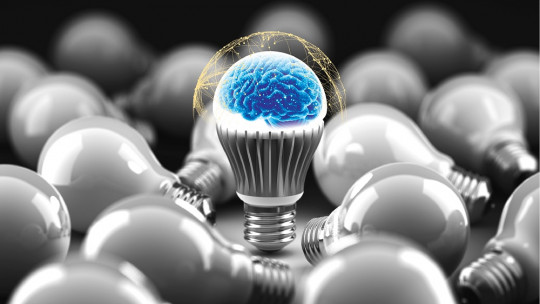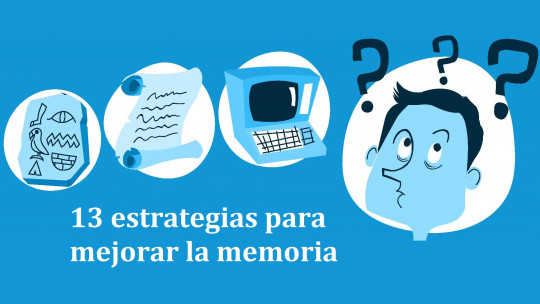Did you know that your mind is capable of predicting your future mood?
The definition of cognitive skills is a set of mental abilities or faculties that allow us to process everything that surrounds us and thus be able to form an appropriate response to our environment. You already know some mental faculties: intelligence, memory, attention or understanding. However, your mind has many secrets that will surprise you.
If you want to discover the 20 cognitive skills that you didn’t know you had, keep reading this interesting article from PsychologyFor, in it you will find What are they a person’s abilities, guys cognitive skills and examples of cognitive skills. Let’s address all the cognitive processes you can imagine, from the most common to the most surprising in order to develop your full potential.
What are cognitive skills
As we mentioned initially, cognitive skills are those mental faculties that help us understand the world around us and to process the stimuli collected by the senses of sight, smell, touch, taste and hearing. According to many experts, the set of all cognitive abilities makes up intelligence or intellectual capacity.
Let’s take an example of cognitive skill: memory. Thanks to this cognitive ability, we can retain stimuli (a movie that we see and hear) and then be able to process it or save it in our memories.
Cognitive skills are the mental abilities that enable us to acquire knowledge, process information, and engage in problem-solving and decision-making tasks. From critical thinking to memory retention, these skills play a crucial role in every aspect of our lives, from learning and academic achievement to professional success and personal development. In this exploration of cognitive skills, we delve into their significance, various types, and strategies for enhancing them to unlock the full potential of the mind.
Understanding Cognitive Skills
Cognitive skills encompass a broad range of mental processes that enable us to interact with the world and make sense of our experiences. Some key cognitive skills include:
- Critical Thinking: The ability to analyze, evaluate, and synthesize information to form logical conclusions and make informed decisions.
- Problem-Solving: The capacity to identify challenges, generate potential solutions, and implement effective strategies to overcome obstacles and achieve goals.
- Memory: The ability to encode, store, and retrieve information from short-term and long-term memory, facilitating learning and retention.
- Attention: The capacity to focus and sustain attention on relevant tasks or stimuli while filtering out distractions.
- Language and Communication: The proficiency in language comprehension, expression, and communication, including verbal and non-verbal cues.
- Executive Functioning: The higher-order cognitive processes responsible for goal setting, planning, organization, time management, and self-regulation.
Importance of Cognitive Skills
Cognitive skills are integral to virtually every aspect of human functioning, influencing academic performance, career success, social relationships, and overall well-being. Here’s why cognitive skills matter:
- Academic Achievement: Strong cognitive skills are essential for academic success, enabling students to grasp complex concepts, solve problems, and excel in various subjects.
- Career Advancement: In the professional realm, cognitive skills are highly valued by employers, as they contribute to innovation, adaptability, and effective decision-making in the workplace.
- Social Interaction: Effective communication and interpersonal skills rely on cognitive abilities such as empathy, perspective-taking, and active listening, fostering meaningful connections with others.
- Life Skills: Beyond academia and career, cognitive skills are essential for everyday tasks such as financial management, problem-solving, and decision-making in diverse life situations.
Types of cognitive skills
The human being has a multitude of skills and mental faculties through which he can know and perceive the world through the senses. These skills can be classified into:
Basic cognitive skills
Cognitive abilities or basic cognitive processes are those that work directly on the information collected by the senses, that is, they are the first to process information from outside the basic cognitive skills are the following:
- Memory
- Perception
- Attention
- Comprehension
- Language
Higher cognitive skills
These are the product of the combination of the first. What are higher cognitive abilities? The following:
- Metacognition
- Motivation
- Emotion
- Learning
- Reasoning
List of cognitive skills
Below we present a list of 20 cognitive abilities:
1. Memorization
Memory is that cognitive ability that allows us Store information In order to later understand it or develop a structured thought, we differentiate between short-term and long-term memory. Both processing are cognitive abilities that operate directly on stimuli. In this article you will find more information about the types of human memory.
2. Perception
Perception is the primary cognitive faculty, the most basic one since, thanks to it, our brain organizes and processes information.
3. Attention
Attention is that cognitive capacity with which we can direct our thinking towards a specific stimulus or action (for example, when we maintain attention in class or in a work meeting).
4. Understanding
Comprehension is a mental skill that helps us understand what is perceived and generate ideas through observation of the environment and the phenomena that occur in it. This is one of the most important basic cognitive skills.
5. Language
One of the mental abilities that most differentiates us from other living beings is the complicated language system that we have. This skill is a system of both vocal and written signs that facilitates the communication process among us.
6. Metacognition
This cognitive ability is also known as the ability to “notice our own thoughts or think about what we are thinking.” Here you will find the definition and examples of metacognition.
7. Motivation
Motivation is the cognitive skill of directing our energy towards a specific goal. Motivation can be intrinsic or extrinsic.
8. Emotion
Emotion is the cognitive ability to express our feelings through a psychological sensation. In this article you will find the definition and a list of emotions.
9. Learning
In combination with memory and perception, we can generate thoughts that allow us to continue improving and adapting our behavior to the environment that surrounds us.
10. Reasoning
It is the cognitive ability that allows us to draw conclusions through perception and understanding.
11. Affective prediction
Also know as affective forecast a surprising cognitive ability with which our brain makes a prediction of our future mood.
12. Lateral thinking
This mental technique is a great help in solving problems since it allows us to look for alternatives to what would be the simplest or “logical” solution. For example, a person with developed lateral thinking can see a conflict from different perspectives and solve it in a new and ingenious way.
13. Emotional intelligence
Probably a skill you already knew. However, did you know that there are neurons in our brain that help us understand the emotional states of others? They are known as mirror neurons.
14. Planning
This mental faculty is the one that designs the steps we are going to take and the decisions we are going to make in a given period of time.
15. Self-regulation
Closely linked to planning, this cognitive skill is based on following each planned step and maintaining both motivation and attention to achieve the established objective. Self-regulation also serves to manage our emotions and produce an appropriate response to each situation.
16. Evaluation
This mental capacity is one that allows us evaluate any phenomenon, feeling or thought, whether your own or someone else’s. We should not confuse evaluation with judgment since the former is not linked to any social or moral factor.
17. Reorganization
We define reorganization as the act of modifying or changing the errors made until we can achieve our objective, an essential cognitive competence to adapt our behavior.
18. Anticipation
It is the cognitive skill that helps us get ahead of new learning Anticipation foresees the steps we are going to take and can predict the results
19. Creative capacity
Also known as creativity, this cognitive ability is what allows us to reproduce in our own way a feeling, thought and even something that our senses have captured. For example, we bring out our creative capacity when we write a poem or paint a painting. Discover here the characteristics of creative and innovative people.
20. Abstraction capacity
We all know imagination and can define it, but did you know that imagination is only one of the many factors that influence the capacity for abstraction? This cognitive ability is defined as the talent or ability to project in our mind all kinds of ideas, thoughts and concepts that cannot be transported to reality.
Examples of Cognitive Skills in Action
To better understand how cognitive skills manifest in real-life situations, let’s explore some practical examples:
At Work
- Attention : A project manager effectively prioritizes tasks and delegates responsibilities to team members while staying focused on the project’s objectives.
- Memory : An accountant accurately recalls financial data from previous quarters to identify trends and make informed forecasts.
- Problem-Solving : An engineer troubleshoots equipment malfunctions by systematically analyzing potential causes and implementing solutions.
- Critical Thinking : A marketing strategist evaluates market research data to develop targeted campaigns that resonate with the target audience.
- Creativity : A graphic designer conceptualizes visually striking designs that capture the essence of a brand’s identity.
In Education
- Attention : A student maintains concentration during lectures by actively engaging with the material and taking organized notes.
- Memory : A medical student recalls anatomical structures and functions during examinations through regular review and practice.
- Problem-Solving : A mathematics student solves complex equations by breaking them down into manageable steps and applying relevant formulas.
- Critical Thinking : A history student analyzes primary sources to form nuanced interpretations of historical events and developments.
- Creativity : An art student explores unconventional techniques and mediums to express personal vision and artistic concepts.
In Daily Life
- Attention : A driver maintains focus on the road while navigating through heavy traffic and reacting to unexpected hazards.
- Memory : A parent remembers important dates and appointments by using calendars and reminders to stay organized.
- Problem-Solving : A homeowner troubleshoots household issues by researching solutions online and seeking advice from experts.
- Critical Thinking : A consumer evaluates product reviews and comparisons before making informed purchasing decisions.
- Creativity : A hobbyist explores new recipes and cooking techniques to create delicious and inventive meals for family and friends.
Techniques to Enhance Cognitive Skills
While cognitive skills are influenced by genetic predispositions and developmental factors, there are several techniques that individuals can employ to enhance and maximize these abilities:
Practice Mindfulness
- Engage in activities such as meditation and deep breathing exercises to improve focus and attention.
Stay Physically Active
- Regular exercise promotes brain health and enhances cognitive function by increasing blood flow and oxygen to the brain.
Challenge Your Brain
- Stimulate your mind with puzzles, games, and activities that require problem-solving and critical thinking.
Maintain a Healthy Lifestyle
- Eat a balanced diet rich in nutrients that support brain health, and prioritize adequate sleep and hydration.
Continuously Learn and Grow
- Pursue lifelong learning opportunities to expand your knowledge base and stimulate cognitive growth.
By incorporating these techniques into your daily routine, you can nurture and strengthen your cognitive skills, ultimately enhancing your overall cognitive functioning and quality of life.
Unleashing the Full Potential of the Mind
Cognitive skills are the cornerstone of human intelligence and adaptability, empowering us to navigate life’s challenges, pursue our goals, and fulfill our potential. By understanding the significance of cognitive skills, recognizing their various types, and adopting strategies for their enhancement, we can unlock the full potential of our minds and thrive in an ever-evolving world of knowledge and innovation.
Cognitive skills are essential for navigating the complexities of modern life, from the workplace to personal relationships. By understanding the various facets of cognitive skills, recognizing examples of their application in different contexts, and employing techniques to enhance these abilities, individuals can unlock their full cognitive potential and thrive in today’s dynamic world.
What Is Cognitive Potential?
Cognitive potential is the inherent ability of an individual to process information, think creatively, and solve problems. It’s not just about IQ or intelligence; it encompasses a wide range of cognitive functions including memory, attention, reasoning, and creativity. Cognitive potential is often seen as the foundation for learning and intellectual development.
Components of Cognitive Potential
Understanding the key components of cognitive potential can help you identify areas where you can grow and improve.
- Memory : The ability to store and recall information is crucial for learning and problem-solving.
- Attention : Focus and concentration allow you to process information efficiently and avoid distractions.
- Reasoning : The ability to analyze information and draw logical conclusions is essential for decision-making.
- Creativity : Thinking outside the box and generating new ideas are important aspects of cognitive potential.
- Problem-Solving : The ability to find solutions to complex issues is a key indicator of cognitive strength.
Factors That Influence Cognitive Potential
Cognitive potential is not fixed; it can be influenced by various factors, both genetic and environmental.
Genetics
Your cognitive potential is partly determined by genetics. Studies have shown that certain genes play a role in cognitive abilities, including memory and problem-solving skills. However, genetics is just one piece of the puzzle.
Environment
The environment in which you grow up and live also has a significant impact on your cognitive potential.
- Education : Access to quality education can enhance cognitive development by providing the tools and opportunities to learn and grow.
- Social Interaction : Engaging with others, especially in intellectually stimulating conversations, can boost cognitive abilities.
- Nutrition : A healthy diet that includes essential nutrients like omega-3 fatty acids, vitamins, and minerals is vital for brain health.
Lifestyle
Your lifestyle choices also play a crucial role in determining your cognitive potential.
- Physical Exercise : Regular physical activity has been shown to improve brain function and protect against cognitive decline.
- Mental Stimulation : Activities like reading, playing musical instruments, or solving puzzles can keep your brain sharp and enhance cognitive abilities.
- Sleep : Adequate sleep is essential for cognitive function, as it helps consolidate memories and supports mental clarity.
How to Enhance Your Cognitive Potential
Engage in Lifelong Learning
One of the most effective ways to boost your cognitive potential is to commit to lifelong learning.
- Take Courses : Enroll in courses or workshops that challenge your mind and expand your knowledge base.
- Read Regularly : Reading a variety of materials, from fiction to non-fiction, can stimulate your mind and improve cognitive function.
- Learn New Skills : Acquiring new skills, whether it’s a language or a musical instrument, can enhance your cognitive abilities by creating new neural connections.
Practice Mindfulness and Meditation
Mindfulness and meditation practices can improve focus, reduce stress, and enhance cognitive function.
- Mindfulness Exercises : Simple mindfulness exercises, such as focusing on your breath or being fully present in the moment, can improve attention and concentration.
- Meditation : Regular meditation has been shown to increase grey matter in the brain, which is associated with improved memory and learning abilities.
Maintain a Healthy Lifestyle
A healthy lifestyle supports cognitive function in many ways.
- Balanced Diet : Eat a diet rich in fruits, vegetables, whole grains, and lean proteins to provide the nutrients your brain needs.
- Physical Activity : Regular exercise increases blood flow to the brain and promotes the growth of new brain cells.
- Sleep Hygiene : Prioritize sleep by maintaining a consistent sleep schedule and creating a restful environment.
Challenge Your Brain
Keeping your brain challenged is crucial for maintaining and improving cognitive potential.
- Brain Games : Engage in brain games like puzzles, crosswords, or Sudoku to keep your mind sharp.
- Problem-Solving Activities : Participate in activities that require critical thinking and problem-solving, such as strategy games or coding.
- Creative Hobbies : Pursue creative hobbies like painting, writing, or playing music to stimulate different areas of your brain.
Socialize and Collaborate
Social interaction is a powerful tool for boosting cognitive potential.
- Join Groups : Participate in social groups or clubs where you can engage in stimulating discussions and collaborative activities.
- Volunteer : Volunteering can provide opportunities to learn new skills, meet new people, and engage in meaningful work that challenges your cognitive abilities.
- Teach Others : Teaching or mentoring others can reinforce your knowledge and help you develop new insights.
The Role of Technology in Enhancing Cognitive Potential
Cognitive Training Apps
There are numerous apps designed to enhance cognitive function through targeted exercises.
- Brain Training Apps : Apps like Lumosity or Elevate offer a variety of games and activities designed to improve memory, attention, and problem-solving skills.
- Language Learning Apps : Learning a new language through apps like Duolingo can enhance cognitive flexibility and memory.
Virtual Reality (VR)
Virtual reality is emerging as a tool for cognitive enhancement.
- Immersive Learning : VR can provide immersive learning experiences that engage multiple senses, making it easier to retain information.
- Cognitive Rehabilitation : VR is also being used in cognitive rehabilitation to help individuals recover from brain injuries or manage cognitive decline.
Cognitive potential is not a fixed attribute; it can be developed and enhanced through intentional practices and lifestyle choices. By engaging in lifelong learning, maintaining a healthy lifestyle, challenging your brain, and leveraging technology, you can unlock the full power of your mind. Remember, the journey to maximizing your cognitive potential is ongoing—there’s always room for growth and improvement.
This article is merely informative, at PsychologyFor we do not have the power to make a diagnosis or recommend a treatment. We invite you to go to a psychologist to treat your particular case.
If you want to read more articles similar to Cognitive skills: what they are, types, list and examples we recommend that you enter our Cognitive Psychology category.
Bibliography
- Navarro, R. (2004). Education and the development of cognitive skills.
- Schmidt, S. (2006). Competencies, cognitive abilities, practical skills and attitudes definitions and development.
- Soledad, BJ (2014). Basic cognitive skills: formation and deterioration/em. UNED Publishing.









